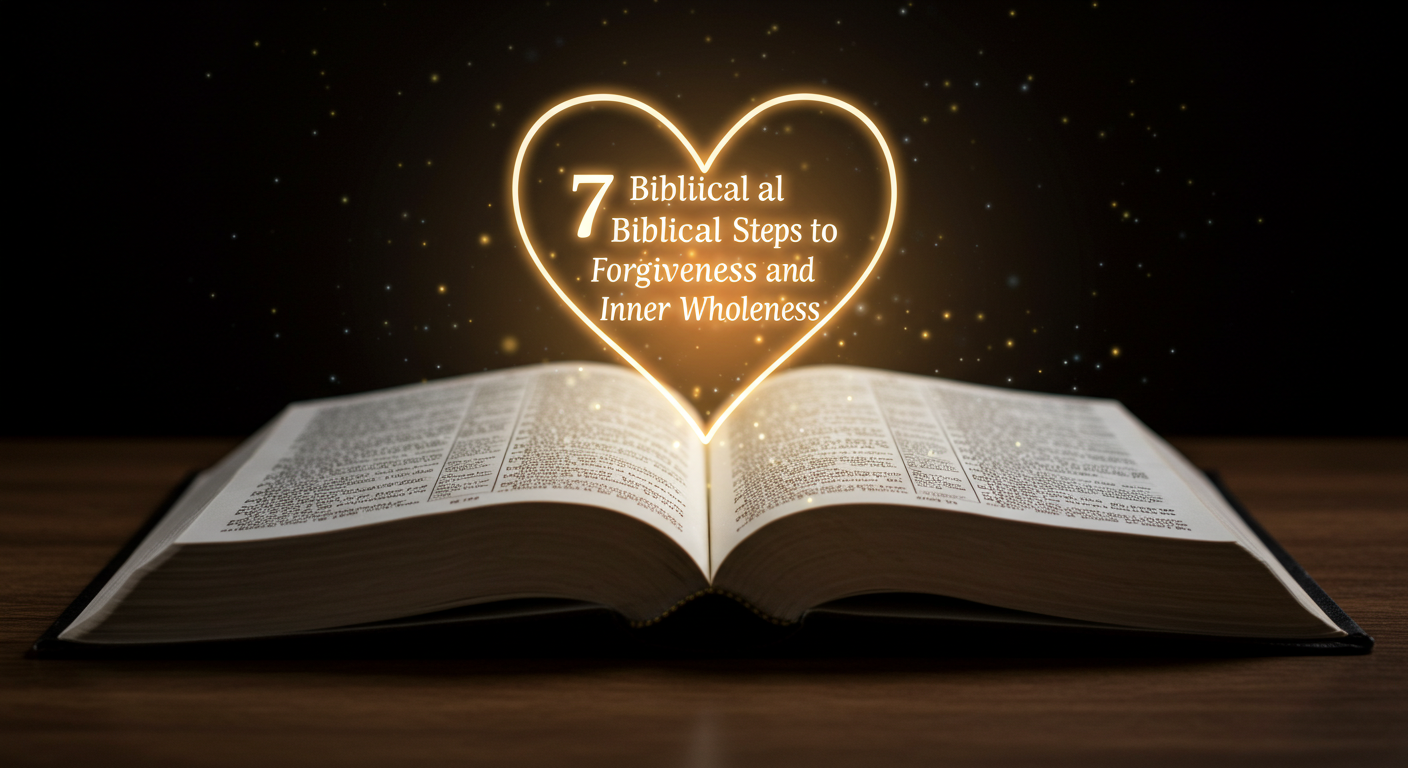7 Biblical Steps to Forgiveness and Inner Wholeness
Forgiveness is a topic that intertwines deeply with many aspects of our lives. It’s not merely about pardoning someone else’s offense but finding a way to inner peace and wholeness. The Bible offers wisdom on this journey, and through these seven steps to forgiveness, you can find a pathway toward freedom from resentment and emotional burden. Let’s explore how these steps, rooted in Scripture, can guide you towards healing and harmony.
Step 1: Recognize the Hurt
Before embarking on the path of forgiveness, the first step is to recognize the hurt you’ve experienced. This acknowledgment is crucial because we can often deny or ignore our feelings, hoping they’ll magically disappear. However, unacknowledged pain tends to fester and grow. The Bible offers insight into this process in Ephesians 4:31: “Get rid of all bitterness, rage and anger, brawling and slander, along with every form of malice.”
By confronting and recognizing the hurt, you allow yourself to process your emotions. You create a space within where healing can begin. Rather than being shackled by invisible chains of denied feelings, this recognition gives you strength. Through reflection and perhaps even journaling, you pave the way for understanding the depth and impact of the hurtful situation. Admitting to yourself that you are hurt is an essential part of the forgiving process.
Step 2: Reflect on the Biblical Concept of Forgiveness
Understanding the biblical concept of forgiveness can be immensely helpful in aligning your actions with these teachings. Forgiveness in the Bible is often tied to love, mercy, and grace. One particularly powerful reference is found in Colossians 3:13: “Bear with each other and forgive one another if any of you has a grievance against someone. Forgive as the Lord forgave you.”
This verse emphasizes the idea of forgiving others as a reflection of the forgiveness we’ve received from God. It’s a humbling reminder that everyone makes mistakes, and just as we seek forgiveness, we are called to offer it. Reflecting on these concepts can reshape your perspective, allowing you to see forgiveness not just as an obligation but as an opportunity for personal and spiritual growth. In this step, you can meditate on the teachings of the Bible, allowing them to deepen your understanding and soften your heart towards others.
Step 3: Seek God’s Guidance Through Prayer
Prayer is a dynamic and personal way to invite God’s presence into your journey towards forgiveness. It’s during prayer that you can find the strength, wisdom, and patience necessary to forgive. Matthew 6:12 offers a timely reminder in the Lord’s Prayer: “And forgive us our debts, as we also have forgiven our debtors.”
Through prayer, you express your desire to forgive, even when it feels impossible. You can ask for the courage to let go of pain and resentment, and seek God’s love to fill the voids left by those negative emotions. Don’t rush this step. Allow yourself the time you need in prayer, whether it’s quietly reflecting or verbalizing your need for divine intervention. Over time, prayer becomes a comforting practice that centers you and builds resilience for the challenging steps ahead.
Step 4: Embrace Empathy
Empathy is the ability to understand and share the feelings of others. When we foster empathy, we open ourselves to a greater understanding of why individuals act the way they do. In Luke 6:31, we find the Golden Rule: “Do to others as you would have them do to you.”
Practicing empathy doesn’t mean condoning harmful behavior but rather trying to see the situation from the other person’s perspective. It involves listening, asking questions, and genuinely attempting to understand their motives. As you embrace empathy, you’ll often find that understanding the other person’s challenges, insecurities, or histories can diffuse your hurt and anger. This shift doesn’t erase the need for boundaries or consequences, but cultivates a softer heart prepared to forgive. It’s in these moments of empathy that true compassion emerges.

Step 5: Choose to Forgive
Forgiveness is a deliberate choice. It’s not about forgetting the past but choosing not to let it dictate your future. In Matthew 18:21-22, Peter asks Jesus how many times he should forgive someone who sins against him, and Jesus responds, “I tell you, not seven times, but seventy-seven times.”
This answer signifies the endless nature of forgiveness. While perhaps daunting in its expansiveness, it highlights that forgiveness isn’t a one-time event but an ongoing process. By choosing to forgive, you free yourself from the shackles of past grievances. This decision may need to be repeated, especially when old feelings resurface, but with time, it will become easier. Forgiveness is, in this sense, a daily practice—an act of self-love that gradually moves you from a place of brokenness to wholeness.
Step 6: Let Go and Trust God’s Justice
Once you’ve chosen to forgive, letting go can still feel like a mammoth task. But remember, forgiveness is not about excusing the wrong or dismissing your hurt; it’s about handing over the burden to a higher power. Romans 12:19 reassures us: “Do not take revenge, my dear friends, but leave room for God’s wrath, for it is written: ‘It is mine to avenge; I will repay,’ says the Lord.”
Trusting God’s justice means releasing the need to see your offender punished or even to receive an apology. It’s about finding peace in the knowledge that God will handle justice as He sees fit. By letting go, you relinquish control and allow space for healing. This step is pivotal in experiencing true inner freedom from the chains of past hurts and in fostering a heart free of bitterness and malice.
Step 7: Embrace Inner Wholeness and Peace
The final step in the journey reflects an achieved state of inner peace and wholeness. It’s the culmination of the previous steps, leading you to a place where your soul feels unburdened and content. In Philippians 4:7, we are promised a peace that transcends understanding: “And the peace of God, which transcends all understanding, will guard your hearts and your minds in Christ Jesus.”
Here, you find contentment, knowing you have done the work to heal and forgive. Inner wholeness isn’t a state of constant joy but an equilibrium where peace prevails over chaos, even when life is challenging. It’s a testament to your resilience and to the strength found in living biblically minded forgiveness. Through reflection, gratitude, and ongoing spiritual practice, you nurture this inner peace, allowing it to flourish in your daily interactions and experiences.
Explore More
For further reading and encouragement, check out these posts:
👉 7 Bible Verses About Faith in Hard Times
👉 Job’s Faith: What We Can Learn From His Trials
👉 How To Trust God When Everything Falls Apart
👉 Why God Allows Suffering – A Biblical Perspective
👉 Faith Over Fear: How To Stand Strong In Uncertain Seasons
👉 How To Encourage Someone Struggling With Their Faith
👉 5 Prayers for Strength When You’re Feeling Weak

📘 Jesus and the Woman Caught in Adultery – Grace and Mercy Over Judgement
A powerful retelling of John 8:1-11. This book brings to life the depth of forgiveness, mercy, and God’s unwavering love.
👉 Check it now on Amazon
As a ClickBank Affiliate, I earn from qualifying purchases.
Acknowledgment: All Bible verses referenced in this article were accessed via Bible Gateway (or Bible Hub).
“Want to explore more? Check out our latest post on Why Jesus? and discover the life-changing truth of the Gospel!”








